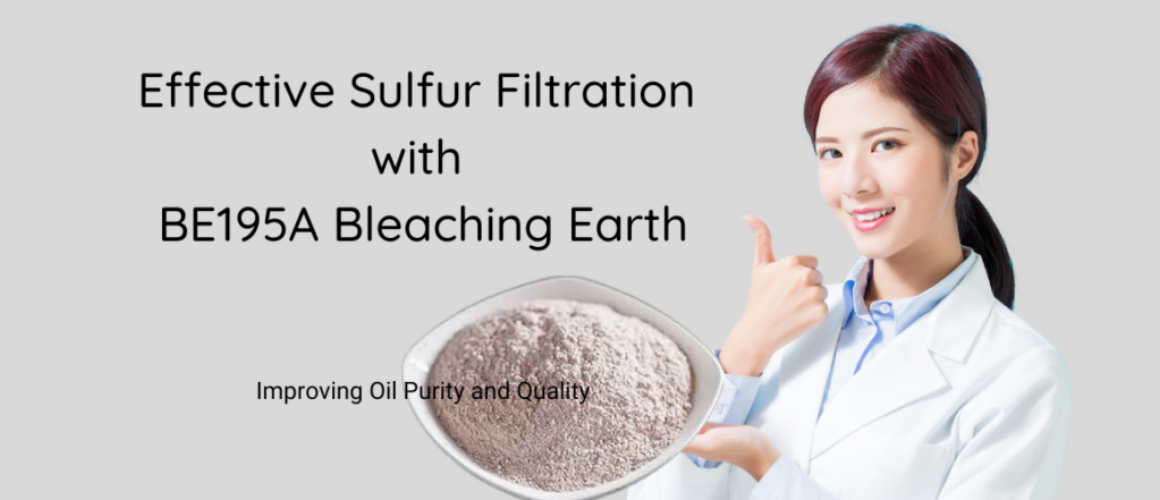Effective Sulfur Filtration with BE195A Bleaching Earth: Improving Oil Purity and Quality


| Key Takeaway | Description |
|---|---|
| Highly Effective Sulfur Filtration | BE195A Bleaching Earth excels at sulfur removal, improving the quality of both edible and industrial oils through efficient adsorption processes. |
| Versatile for Multiple Applications | Suitable for a range of oils, BE195A is used in both food-grade and industrial sectors, demonstrating versatility and reliability. |
| Eco-Friendly and Sustainable | Supports sustainable oil refining by reducing waste and enabling oil recycling, making it an environmentally responsible choice. |
| Improves Oil Quality and Compliance | Removes sulfur compounds, odors, colors, and other impurities to meet oil refining standards and ensure high-quality end products. |
| Cost-Effective and Efficient | BE195A offers a cost-effective solution for oil purification, minimizing the need for repeated filtration and optimizing overall processing costs. |
Table Of Content
“Eco-friendly and efficient, BE195A Bleaching Earth supports sustainable oil refining practices by reducing waste and improving oil recyclability.”
Introduction
When it comes to oil refining, sulfur is one of those pesky impurities that just doesn’t want to go away. It’s a persistent component that can affect everything from the smell and color of the oil to its compliance with refining standards. Sulfur filtration is crucial for ensuring that oil, whether edible or industrial, meets quality benchmarks and environmental standards. Over time, I’ve come to rely on BE195A Bleaching Earth as an effective solution for this challenge, a product that consistently impresses with its ability to remove sulfur and other contaminants from oils.
Sulfur removal in oil refining is essential because sulfur compounds can negatively impact both the oil’s quality and the machinery involved in the refining process. BE195A Bleaching Earth plays a vital role here, serving as a trusted agent for sulfur filtration with bleaching earth. This post dives deep into why BE195A is so effective, how it works, and the range of benefits it offers to those in the oil industry.
What is BE195A Bleaching Earth?
BE195A Bleaching Earth is a specialized clay product designed for one job: to clean and purify oils with impressive efficiency. This activated bleaching earth, composed of natural minerals, undergoes treatment that enhances its absorptive properties. This activation process creates an ideal surface for removing impurities, making it an exceptional choice for those looking to improve oil purity and quality.
In my experience, BE195A is particularly effective for sulfur filtration because it has been tailored to trap sulfur compounds and other unwanted elements through an advanced adsorption process. Its unique blend of properties is why it’s such a reliable choice in the industry, especially for those of us who need a product that consistently delivers high results. For those interested in exploring more about the nature of bleaching earth for oil purification, I recommend checking out A Complete Guide to Bleaching Earth.
Properties of BE195A Bleaching Earth
| Property | Description |
|---|---|
| Material | Activated Bleaching Earth |
| Color | White or white-grey powdered solid |
| Odor | Odorless |
| pH | Max 4.0 |
| Particle Size | 200 Mesh |
| Moisture Content | Max 12% |
| Bulk Density | 0.60 – 0.70 g/ml |
| Sulfur Adsorption | High efficiency in sulfur removal and contaminant filtration |
Why is Sulfur Filtration Important in Oil Refining?
Sulfur is not just an impurity; it’s a game-changer when it comes to oil quality. The presence of sulfur compounds can lead to unpleasant odors, alter the oil’s color, and create issues with oil refining standards. That’s why sulfur removal in oil refining isn’t just optional—it’s necessary. Without proper sulfur filtration, refined oils would struggle to meet the benchmarks set by both regulatory bodies and industry standards.
The desulfurization process is an essential part of refining, especially for those in the edible oil industry. Ingesting sulfur compounds can be harmful, so ensuring these compounds are removed is key to producing a safe product. BE195A Bleaching Earth offers a reliable solution by targeting sulfur compounds specifically, using a filtration process that effectively reduces sulfur content and improves oil quality.


How BE195A Works for Sulfur Filtration
So, how does this amazing clay actually pull sulfur out of oils? The answer lies in adsorption. The activated properties of BE195A allow it to attract and retain sulfur compounds on its surface. During this process, the clay particles bind with sulfur, trapping it within the bleaching earth, so it doesn’t re-enter the oil. This process makes BE195A highly effective for sulfur adsorption capacity compared to other filtration methods.
In terms of how BE195A compares to alternative sulfur filtration methods, its advanced adsorption process allows it to deliver results that are not only efficient but also cost-effective. The product’s composition, including its porosity and particle size, enhances its ability to retain sulfur compounds. I’ve observed that the filtration process consistently yields oils that are clearer, purer, and of a higher quality.
Sulfur Filtration in Oil Refining Process
| Step | Description |
|---|---|
| Oil Pre-Treatment | Initial filtration to remove large impurities |
| Acid Activation | Treatment of bleaching earth to increase sulfur adsorption capacity |
| Mixing | BE195A is mixed into the oil at a precise dosage |
| Adsorption | BE195A binds to sulfur compounds and other impurities, removing them from the oil |
| Filtration | Oil is filtered to separate BE195A and captured impurities |
| Final Polishing | Additional filtration if necessary to ensure oil meets quality and regulatory standards |
Benefits of Using BE195A Bleaching Earth for Sulfur Filtration
Let’s talk about the perks of using BE195A for sulfur filtration—it’s more than just getting the job done. One of the greatest benefits I’ve noticed is the improvement in overall oil quality. By removing sulfur, BE195A helps produce oils that are free from the impurities that would otherwise impact their performance and appeal. It’s an approach that aligns with sustainable oil refining practices by reducing waste and improving efficiency.
In addition to quality improvements, BE195A also helps in meeting oil refining standards and achieving compliance with regulatory guidelines. This is especially relevant in the edible oil sector, where safety is paramount. Beyond the functional benefits, BE195A is an eco-friendly product that contributes to sustainable practices. Those interested in taking advantage of these benefits can find more information on our Bleaching Earth page.
Benefits of BE195A for Sulfur Filtration
| Benefit | Description |
|---|---|
| High Adsorption | Effectively adsorbs sulfur and other impurities, improving oil quality |
| Cost-Effective | Reduces the need for repeated filtering, optimizing the refining process |
| Eco-Friendly | Supports sustainable practices by enabling oil recycling and reducing waste |
| Regulatory Compliance | Helps meet industry standards and regulatory requirements for both edible and industrial oils |
| Versatile | Suitable for various oil types, including edible and industrial oils |
| Improves Oil Quality | Enhances the color, odor, and purity of the final oil product |
Beyond Sulfur—Other Impurities BE195A Handles
While sulfur is a big deal, BE195A also tackles a range of other impurities that can affect oil quality. For instance, oil decolorization is another area where BE195A shines. The product’s properties allow it to remove unwanted colors from oils, giving them a clearer, more attractive appearance. The process is simple but effective, thanks to the clay’s high adsorptive capacity and porosity.
BE195A’s versatility extends to the removal of other contaminants like residual phospholipids and trace metals. This versatility makes it an invaluable tool not just for vegetable oil purification, but also for a host of industrial applications. For a broader look at how BE195A tackles these various challenges, I recommend reading Unlocking the Purifying Power of Bleaching Earth, which goes into further detail about the product’s applications.
Common Contaminants Removed by BE195A
| Contaminant | Effect on Oil | Removal Process |
|---|---|---|
| Sulfur Compounds | Affects odor, color, and compliance | Adsorption |
| Phospholipids | Leads to oil degradation | Adsorption |
| Trace Metals | Can cause oxidation and quality issues | Adsorption and filtration |
| Free Fatty Acids | Decreases oil stability | Neutralization |
| Pigments (Carotenoids) | Discolors the oil, impacting visual appeal | Decolorization |
| Oxidation Products | Contributes to rancidity | Adsorption and purification |
Tips for Maximizing the Effectiveness of BE195A Bleaching Earth
To get the most out of BE195A, there are a few tips and tricks that can make a big difference. First, it’s important to handle the product correctly. Storing it in a cool, dry place and keeping it in airtight containers will help preserve its absorptive properties. Using the right dosage and mixing thoroughly are also key to optimizing its performance, ensuring that oil purification methods yield the best possible results.
One insight I’ve picked up over the years is the importance of adjusting the dosage depending on the oil type and impurity levels. Doing so can not only improve the sulfur removal process but also enhance overall purification outcomes. This approach ensures a cost-effective sulfur filtration process that doesn’t waste resources, making it both efficient and sustainable.
Tips for Maximizing BE195A Effectiveness
| Tip | Explanation |
|---|---|
| Proper Storage | Store in a cool, dry place to maintain adsorptive properties |
| Appropriate Dosage | Adjust dosage based on oil type and impurity levels for optimal results |
| Mix Thoroughly | Ensure even distribution within the oil for effective impurity capture |
| Monitor Oil Temperature | Keep oil within the recommended temperature range to enhance sulfur adsorption |
| Regular Equipment Maintenance | Regularly clean and maintain filtration equipment to ensure BE195A performs effectively |
| Dispose Responsibly | Follow environmental guidelines for the disposal of used bleaching earth after filtration |


Frequently Asked Questions
What is BE195A Bleaching Earth?
BE195A Bleaching Earth is an activated clay product specifically designed for removing impurities, including sulfur, from oils. Its high adsorption capacity makes it ideal for use in both edible and industrial oil refining.
How does BE195A Bleaching Earth remove sulfur from oil?
BE195A works through an adsorption process. The activated clay particles bind with sulfur compounds, trapping them on the surface of the bleaching earth, which is then filtered out from the oil, resulting in a purer product.
Can BE195A Bleaching Earth be used for both edible and industrial oils?
Yes, BE195A is versatile and suitable for sulfur filtration in various oils, including vegetable oils, mineral oils, and other industrial oils. It effectively improves oil quality by removing contaminants like sulfur, phospholipids, and trace metals.
Is BE195A Bleaching Earth eco-friendly?
Absolutely. BE195A supports sustainable oil refining practices by enabling oil recycling and reducing waste. It’s an eco-friendly product that contributes to more environmentally responsible oil processing.
What are the benefits of using BE195A for sulfur filtration?
BE195A offers several benefits, including high sulfur adsorption capacity, cost-effectiveness, improved oil quality, and compliance with oil refining standards. It also enhances the oil’s color, odor, and purity.
How should BE195A Bleaching Earth be stored?
BE195A should be stored in a cool, dry place and kept in an airtight container to preserve its adsorptive properties. Proper storage ensures that it remains effective for sulfur filtration.
Can BE195A remove other impurities besides sulfur?
Yes, BE195A is effective at removing various impurities, including free fatty acids, pigments, and oxidation products. It’s commonly used for decolorization and overall purification of oils.
What is the recommended dosage of BE195A for oil filtration?
The dosage of BE195A depends on the type of oil and the level of impurities. It’s best to start with a small amount and adjust based on the specific requirements of the oil being treated.
Is BE195A Bleaching Earth safe for use with food-grade oils?
Yes, BE195A Bleaching Earth is commonly used in the refining of edible oils. It meets industry standards for food safety and is an effective solution for removing impurities in oils used for consumption.
Where can I buy BE195A Bleaching Earth?
You can purchase BE195A Bleaching Earth directly from our product page and explore our full range of bleaching earth products on our Bleaching Earth category page.
Conclusion
Sulfur filtration may seem complex, but with BE195A Bleaching Earth, it’s a manageable and rewarding process. This product has proven time and again to be an effective solution for sulfur and impurity removal, producing high-quality oils that meet industry standards and consumer expectations. Whether you’re refining edible or industrial oils, BE195A offers a dependable, eco-friendly option that supports sustainable oil refining practices.
If you’re ready to experience the benefits of sulfur filtration with bleaching earth for yourself, I invite you to explore our product page. For more in-depth information on bleaching earth and its broader applications, check out our cornerstone resource A Complete Guide to Bleaching Earth. Let BE195A transform your oil refining process with efficiency, sustainability, and quality.
Comparison of BE195A vs. Other Filtration Methods
| Filter Material | Sulfur Adsorption Capacity | Eco-Friendly | Cost-Effectiveness | Versatility | Efficiency in Oil Refining |
|---|---|---|---|---|---|
| BE195A Bleaching Earth | High | Yes | High | High | Excellent |
| Activated Carbon | Medium | Yes | Medium | High | Good |
| Silica Gel | Low | Yes | Low | Medium | Moderate |
| Clay (Non-activated) | Low | No | Low | Low | Poor |
| Synthetic Adsorbents | Medium | Varies | Medium | Medium | Good |
Disclaimer: This article is for informational purposes only and should not be considered as a substitute for professional advice. Always consult with a specialist before implementing any new refining practices.
ขอบคุณที่ใช้เวลาอ่านบทความของเราเกี่ยวกับการป้องกันความชื้น ทางเราหวังว่าท่านจะได้รับข้อมูลที่มีคุณค่าและเป็นประโยชน์ ทางเรายินดีให้บริการการปรึกษาฟรีเพื่อพูดคุยเกี่ยวกับความต้องการของท่านและให้คำแนะนำเกี่ยวกับวิธีการป้องกันความชื้นที่กำหนดเฉพาะสำหรับคุณ โปรดติดต่อเราที่ 0858124188 เพื่อนัดหมายการปรึกษาหรือเยี่ยมชมร้านค้าของเราเพื่อค้นหาผลิตภัณฑ์ที่ช่วยป้องกันสินค้าของคุณจากความเสียหายจากความชื้น ทางเราหวังว่าจะได้รับข่าวสารจากท่านเร็วๆนี้
